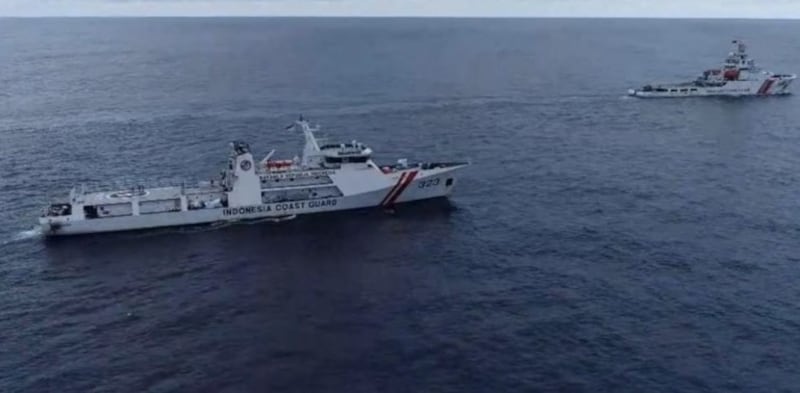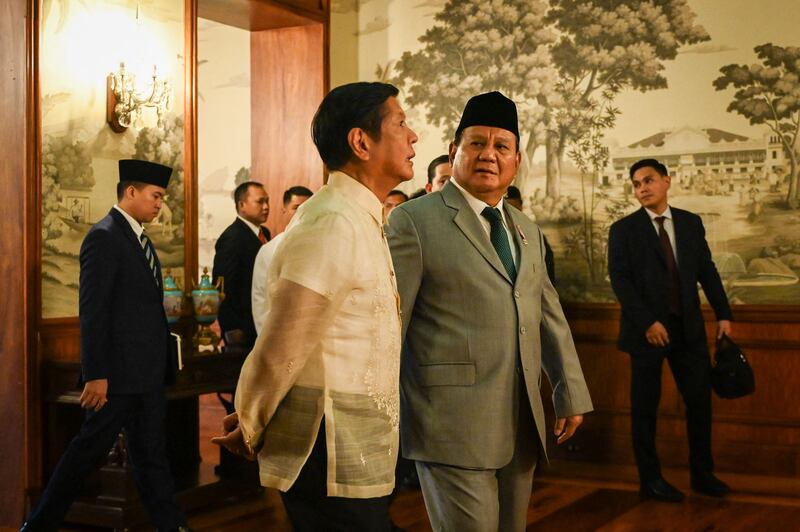Indonesia is seeking to contain the fallout from a maritime cooperation agreement with China that analysts say appears to indicate a softening of Jakarta’s stance on Beijing’s expansive claims in the South China Sea.
A joint statement released after a meeting between Indonesian President Prabowo Subianto and Chinese President Xi Jinping in Beijing on Saturday said the two countries had reached an "important common understanding on joint development in areas of overlapping claims."
This “understanding” or agreement compromised Indonesia’s territorial and maritime rights, most regional experts said.
One security analyst, though, noted on X that a clause stating that the cooperation would proceed only under the laws of both countries may mean the agreement will end up dead in the water.
Jakarta had consistently rejected the Beijing-set boundary, which encompasses most of the South China Sea and encroaches into Jakarta’s exclusive economic zone (EEZ) north of the Natuna islands, noted Eddy Pratomo, an ex-member of the Indonesian government’s law of the sea negotiation team.
“[But] with this Indonesia-China joint statement, it appears Indonesia is now acknowledging overlapping claims,” Eddy, an international law professor at Diponegoro University, told BenarNews.
“This could be seen as tacit recognition of China’s dashed-line claim over the South China Sea, particularly around the North Natuna Sea,” he said.

Beijing uses the nine-dash line on maps to demarcate its extensive claims in the South China Sea, where it is embroiled in territorial disputes with Brunei, Malaysia, the Philippines and Vietnam in regional bloc Association of Southeast Asian Nations (ASEAN), as well as Taiwan.
Eddy warned that China could use the agreement with Indonesia to pressure these claimant states to accept the nine-dash line.
This China-drawn boundary infringes on the claimant states’ EEZs that give these countries exclusive rights to up to 200 nautical miles from their coastlines to regulate fishing and exploit natural resources, he said.
The Indonesia-China joint statement did not specifically say the two countries would cooperate on projects for oil and gas discovery or extraction, although that is the activity that Jakarta mainly carries out in its South China Sea EEZ, which it has named North Natuna Sea.
The Indonesian Ministry of Foreign Affairs attempted damage control and issued a statement Monday, saying the agreement did not amount to a recognition of Beijing’s line.
“Nothing in the cooperation may be construed in any way as a recognition of the ‘9-dash line’ claim. Indonesia maintains its well-known position that the claim lacks an international legal basis and is tantamount to undermining the UNCLOS 1982,” the statement said.
“Therefore, the cooperation shall, under no circumstances, affect Indonesia’s sovereignty, sovereign rights, or jurisdiction in the North Natuna Sea.” UNCLOS is the U.N. Convention on the Law of the Sea.
The Indonesian foreign ministry said the cooperation would mainly be in the fields of fisheries and fisheries conservation in the region.
BenarNews reached out to foreign ministry spokesman Roy Soemirat for details on how the agreement came about and whether Jakarta had vetted the text, but did not hear back from the official.
The agreement comes amidst a backdrop of escalating tensions in the South China Sea, a crucial maritime route for global commerce.
Just last month, during the first week of Prabowo’s presidency, Indonesian naval and coast guard vessels confronted and expelled a Chinese coast guard ship from Indonesia’s exclusive economic zone in the North Natuna Sea on three occasions.
‘China’s nine-dash line trap’
Backlash to news about the agreement was swift, both at home and abroad, despite the foreign ministry’s statement on Monday.
Aristyo Rizka Darmawan, a lecturer in International law at Universitas Indonesia, slammed as “vague” the Indonesian foreign ministry’s statement that it still did not recognize the nine-dash line.
The ministry’s statement “contradicts the joint statement and was released unilaterally, while the joint statement was made by Indonesia and China together,” he wrote in an analysis published Tuesday for The Lowy Institute, an Australian think-tank.
That means it’s possible that China may continue to hold the interpretation presented in the joint statement, he further wrote.
“Indonesia appears to be the first ASEAN member-state to implicitly recognize Beijing’s ‘nine-dash line’… and therefore the first ASEAN country to fall into China’s nine-dash line trap,” Aristyo added.
He further said that the agreement had betrayed Indonesia's national interest.
“It is consequential for Indonesia’s sovereign rights to use resources in its EEZ and continental shelf, and [the agreement] has significantly changed the political constellation and solidarity of ASEAN claimant states in the South China Sea,” he wrote.

Opposition lawmaker Tubagus Hasanuddin, a member of the defense and foreign affairs committee in Indonesia’s House of Representatives, questioned the government’s approach to handling sensitive regional issues, particularly concerning the South China Sea.
“The Foreign Ministry needs to exercise greater caution and responsiveness in handling official statements,” he said in a press release.
“They shouldn’t act as a ‘firefighter’ only when problems arise.”
He also raised concerns about the potential consequences of such an agreement for Indonesian fishermen, citing past instances of Chinese vessels entering Indonesian waters and engaging in illegal fishing.
“Will this economic cooperation benefit us? Will Chinese fishing vessels then be free to roam in the Natuna area to catch our fish?”
One clause in the joint cooperation agreement, however, could mean it would not go through, said Euan Graham, senior analyst at The Australian Strategic Policy Institute.
“[T]he reference to “prevailing laws” means [the] agreement may be difficult for Prabowo to push through,” he noted on X.
The part of the joint statement Graham is referring to says that the joint development would be “based on the principles of ‘mutual respect, equality, mutual benefit, flexibility, pragmatism, and consensus-building,’ pursuant to their respective prevailing laws and regulations.”
Several analysts noted that Prabowo or Foreign Minister Sugiono needed to soon clarify what exactly the joint development was referring to and how the wording got into the joint statement.
‘Potential slippery slope’
The Indonesia-China joint development agreement has consequences not just for Indonesia but could potentially reshape geopolitical dynamics in Southeast Asia and draw responses from the United States and Japan, said international law expert Hikmahanto Juwana.
“Countries in dispute with China will question Indonesia’s position,” Hikmahanto, a University of Indonesia professor, told BenarNews.
The Indonesian government’s agreement with China might reflect a pragmatic alignment with a major political power, but it could potentially destabilize the region, said Muhammad Waffaa Kharisma, an international relations researcher at the Centre for Strategic and International Studies (CSIS).
“In the short term, this statement may benefit Indonesia by easing tensions with China, particularly by reducing the likelihood of coast guard confrontations in the South China Sea,” he told BenarNews.
“However, in the long term, it could harm Indonesia’s standing with Southeast Asian neighbors. This is a potential slippery slope.”
Pizaro Gozali Idrus in Jakarta contributed to this report.
